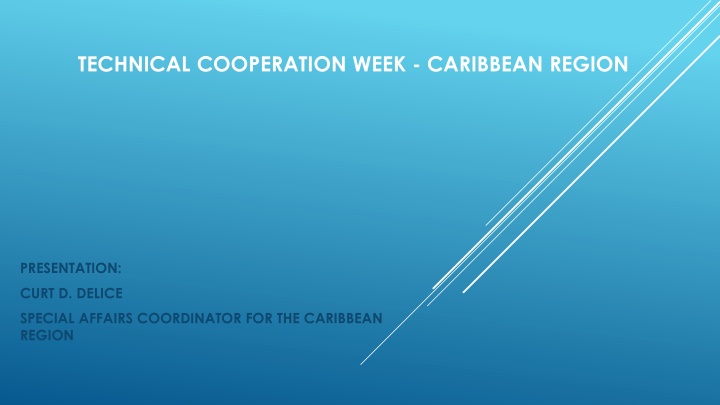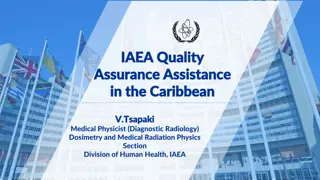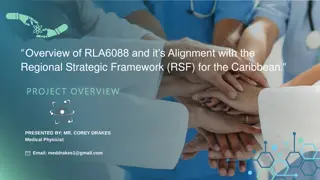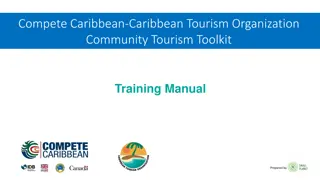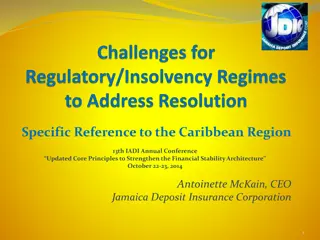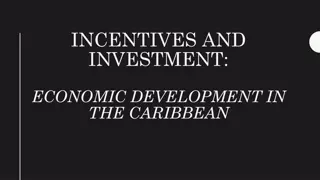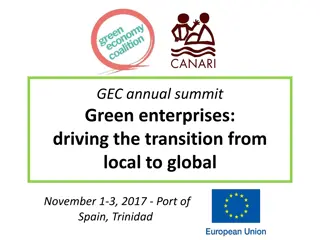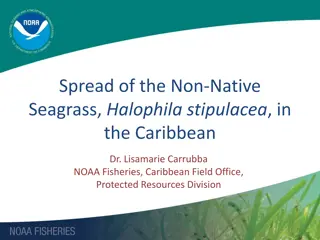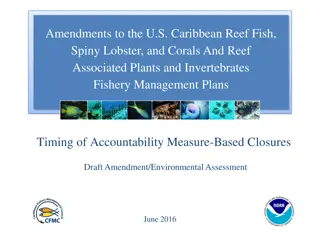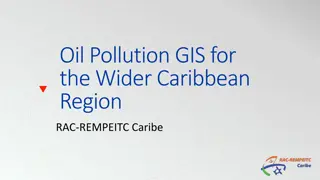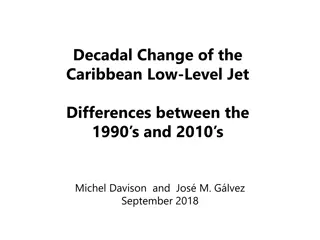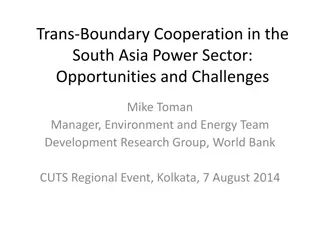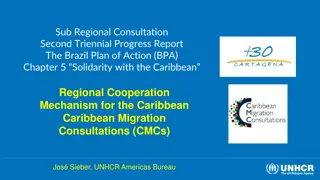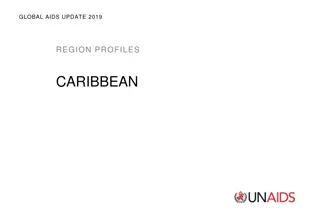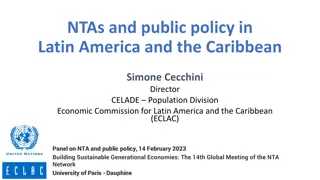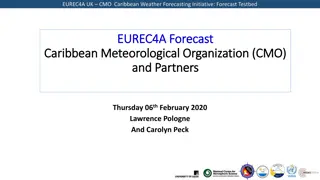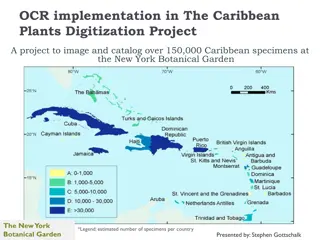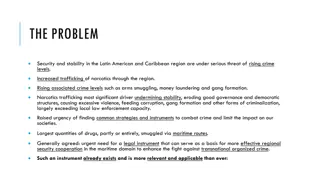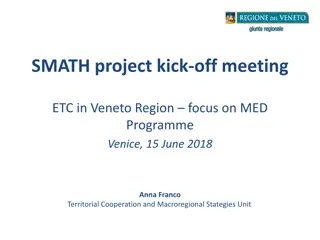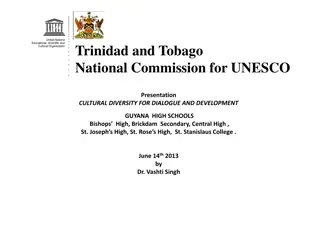Technical Cooperation Challenges in Caribbean Region
Generally, discussions during the Technical Cooperation Week in the Caribbean Region highlighted limitations in executing technical cooperation effectively. Factors such as poor coordination of resources, lack of communication on priorities, and inadequate alignment with member states' needs were identified as hindrances. The need for improved collaboration, ownership, and stakeholder coordination was emphasized for enhanced efficiency.
Download Presentation

Please find below an Image/Link to download the presentation.
The content on the website is provided AS IS for your information and personal use only. It may not be sold, licensed, or shared on other websites without obtaining consent from the author.If you encounter any issues during the download, it is possible that the publisher has removed the file from their server.
You are allowed to download the files provided on this website for personal or commercial use, subject to the condition that they are used lawfully. All files are the property of their respective owners.
The content on the website is provided AS IS for your information and personal use only. It may not be sold, licensed, or shared on other websites without obtaining consent from the author.
E N D
Presentation Transcript
TECHNICAL COOPERATION WEEK - CARIBBEAN REGION PRESENTATION: CURT D. DELICE SPECIAL AFFAIRS COORDINATOR FOR THE CARIBBEAN REGION
TCW FACILITATORS-CARIBBEAN REGION GROUPS FACILITATOR WILMOT GARNETT RACHELLE PIERRE-LOUIS ENA HARVEY KENT COIPEL QUESTIONS 1 & 2 QUESTIONS 1 & 3 QUESTIONS 1 & 4 QUESTIONS 1 & 5
OBSERVATIONS ON GROUP DISCUSSIONS Generally agreed that the discussions were well received and is a positive step towards improving institutional efficiency in the planning and execution of technical cooperation actions; Generally accepted that exercises like this not only introduced staff members from different member states, disciplines, experiences, programmes and Delegations together, but it also fosters positive staff interrelationships within the Institute; The group discussions were efficiently managed by the Group Facilitators; Discussions were rich/profound, with active participation by group members; It was felt generally that the time was insufficient for the multi-faceted nature of the questions which requires time for adequate ventilation; The discussions seemingly gave the impression that the Institute lacked dynamism, integration, flexibility in relation to the TCP and MTP; It was instructive that limited financial resources features as a key constraint emanating from Delegations, but the Observers, nor DTC respondents identified it as such; It would probably be useful, particularly due to time constraints, that the survey results of the various respondents groups, Delegations, Observers and DTC, are first analyzed/discussed/prioritized among each Group of respondents, then a sanitized version is forwarded to the Regional Coordinator/Facilitators for further analysis and entry into final group discussions.
QUESTION 1: WHAT ARE THE THREE MAIN FACTORS THAT LIMIT THE EFFECTIVENESS OF TECHNICAL COOPERATION? 100% of GROUPS Insufficient/poor effectively execute technical cooperation programmes/actions among HQ Units, TC Programmes and Delegations coordination of human/financial resources to efficiently and 75% of GROUPS Lack of effective communication on technical cooperation priorities and decision making among HQ Units, TC Programmes and Delegations 50% of GROUPS Inadequate alignment of programs and technical planning to directly address the priority areas identified by member states and the region, which results in the lack of ownership, collaboration and coordination among stakeholders. [unavailability of appropriate documents, tools needed to respond effectively to technical execution requirements in member states]
QUESTION 1: WHAT ARE THE THREE MAIN FACTORS THAT LIMIT THE EFFECTIVENESS OF TECHNICAL COOPERATION? (CONT D) 50% of GROUPS Continuous loss of built capacity of technical staff in Public sector. Limited Absorptive & Implementation Capacity result in challenges with execution even if we have access to external resources. Deficiencies with Human Resource Capacities and areas of competence within the Institute and the limited adsorptive capacities within the national authorities to articulate and respond to their challenges/ national demands as well as execution of TC actions] 25% of GROUPS The amount of demands placed on IICA offices is greater than the available resources at any given point, and this is exacerbated by limited capacity for resource mobilization
QUESTION 2: WHAT PROCEDURES DO WE USE TO IDENTIFY TRULY STRATEGIC TECHNICAL COOPERATION REQUIREMENTS IN COUNTRIES AND REGIONS? Direct stakeholders at the national, regional and hemispheric level. engagement through consultations with relevant IICA conduct needs assessment both at the national and regional levels and disseminate results to ensure that the priorities, opportunities and synergies are identified and realized.
QUESTION 3: WHAT ARE THE CRITERIA, INPUTS AND / OR PROCEDURES THAT WE USE FOR THE SELECTION OF TECHNICAL COOPERATION DEMANDS? Alignment with the national priorities/actions (environment, energy ) and the MTP. IICA's staff has to be informed about the national priorities and understand the policy framework under which the member country operates. The local staff has to increase collaboration to reinforce alliances with strategic partners for sharing information. Potential to provide significant, visible and sustainable impact. Sustainability of our technical actions can help partners and government to keep trusting us. The results of such implementation must be readily evident to stakeholders and result in positive changes. IICA's technical strengths, financial and human resources. The selection of technical cooperation demands has to match with IICA's capacity, in terms of strengths -is this an area of expertise best suited for IICA?-, financial and human resources, ensuring that member countries have the various capacities to plan, execute and maintain activities. Capacity for resource mobilization, potential of the activities to generate funds for additional and more impactful actions.
QUESTION 4: HOW CAN WE DEVISE NATIONAL AND REGIONAL TECHNICAL COOPERATION STRATEGIES THAT INVOLVE THE OFFICES, DTC AND THE PROJECT MANAGEMENT UNIT? PROPOSE THREE ACTIONS THAT WOULD ENABLE US TO OVERCOME LIMITATIONS AND TO TAKE ADVANTAGE OF OPPORTUNITIES? Develop absorptive agencies wanting to make direct/3rd party allocations through IICA and undertake stakeholder analysis of private sector and, Target/Develop more sub-regional/regional vs. national financing options: especially for the ECS where efficiency and resource mobilization gains for a large multi- national project/ programme may surpass national project scope. requires very clear understanding of national priorities to enable effective coordination and planning, and IICA having coherent position on common, macro issues across countries which would factor into medium- term planning on priorities Define specific programming process across the Institute; Build teams to attend competence and which are aligned to national/sub-regional/regional priorities; and use Google shared matrix or grid where offices post demands with timelines which can be reviewed by DTC and with offices programmes & implementation to build/support capacity: improvements engage in multinational in-country with This to specific areas of Institutional
QUESTION 5: HOW CAN WE ENSURE THAT OUR TC STRATEGY IS DYNAMIC, INTEGRATING, FLEXIBLE AND ALIGNED WITH THE REQUIREMENTS OF COUNTRIES AND THE SUPPLY OF TC DEFINED BY THE MTP? PROPOSE ACTIONS THAT WOULD INVOLVE JOINT EFFORTS AND COORDINATION BETWEEN DIFFERENT UNITS ? Formulate clear processes, frameworks, tools and methodologies that are simplified, standardized with less bureaucratic hurdles to guide planning of TC programs Adopt a Multidisciplinary evaluation/feedback and assessments of results, programs, demands and impacts of TC Engage in a more iterative planning process (including analyses of national demands) that allows for flexibility in planning, coordination and execution Establish mechanism(s) for efficient mobilization of human resource capacities not only within the Institute but also with other strategic partners. Enhance the effectiveness of TC through continuous communication and resource mobilization. Institute a mechanism to systematize lessons learnt, best practices, tools and processes and avail them to all delegations.
GENERAL IMPRESSIONS ON THE TCW PROCESS The selection of 3 constraints in Question 1 does not adequately capture the complexity of the issues facing the institute Greater promotion/ visibility given to TCW prior to its commencement to build enthusiasm and commitment to the process Unwillingness/ inability to embrace the need for change within the Institute affects the efficacy and dynamism of the TC agenda. Change management strategies should be actively embraced by Management rather than a passive expectation to change. Probably TCW should include a component on Theory of Change. Institutional silos limit institutional gains and its existence needs to be actively monitored and acted upon to negate its impact. The process should also focus on sensitizing staff and management about its perils.
CONCLUSIONS (CARIBBEAN REGION ASPIRATIONS/VISION) Seamless communication and coordination between technical cooperation programmes/DTC and Delegations in the Region Complete harmonization between technical cooperation demands in member states and the technical cooperation priorities of IICA programmes That IICA Delegations could move from individualism in TC to a more holistic regional vision of mandate with optimization of human/financial resources That IICA becomes the preferred regional agency for execution of technical cooperation projects in agriculture/rural development by member states/international donors and a centre for technical know-how in agric/rural dev. That IICA fully participates at all levels in key dialogue, planning and execution of regional imperatives on agriculture/rural development
